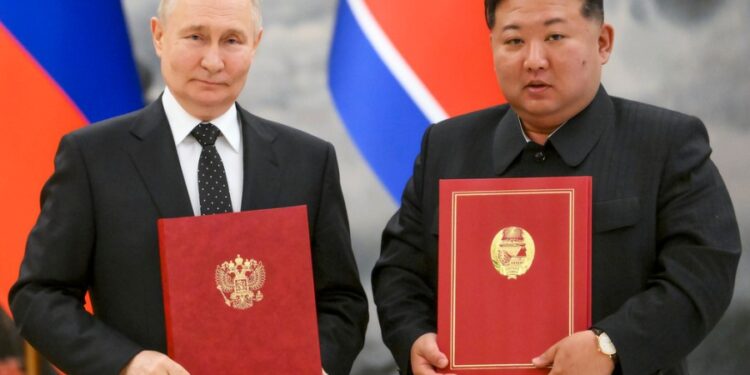
It’s time for the international community to fully recognize the gravity of the deepening alliance between Russia and the Democratic People’s Republic of Korea, which empowers them both and makes them growingly dangerous for the U.S., Europe and our allies in the Indo-Pacific. Instead of ridiculing the desperation of Russia having to turn to the North Koreans, we need to consider the fact that this may shape the trajectory of the war of aggression and tip the balance of power in favor of authoritarian regimes.
It’s a reality now that the forces of a totalitarian dictatorship with an illicit nuclear weapons program are directly supporting Russia in its aggression against Ukraine by participating in the fighting just few hundred miles from NATO’s border.
It’s alarming at first because it makes clear that Russia’s war effort is no longer solely reliant on its own resources, but is increasingly dependent on a network of authoritarian regimes that are strengthening each other’s military capabilities.
Already for too long, the extensive delivery of North Korea’s missiles and artillery shells has allowed Russia to preserve its own dwindling resources and offered Russia a cheap way to keep fighting without having to deplete its own stockpiles, buying time and space for its own production. Now, North Korea is making it possible for the war to drag on by sending its soldiers to the battlefield.
North Korea’s help provides an immediate and cheap military boost to Russia. It allows Moscow to postpone full-scale mobilization and therefore diminishes the risk of domestic unrest. Human life has no inherent value in Russia or in North Korea, whereas Ukraine tries to spare its forces as much as possible. This gives Russia an upper hand on the frontline.
But more importantly, this deeper cooperation means great empowerment for North Korea, which gains access to cutting-edge military technologies to advance its nuclear program, hard currency that will further feed the aggressiveness of the regime and training from Russia that significantly enhances its capabilities. The North Korean units that have not fought a war in decades will acquire firsthand combat experience on the battlefield — even when not many of them are expected to return home — and Ukraine will serve as a testing ground, including for new weapons systems.
North Korea, already one of the world’s most aggressive and unpredictable regimes, now finds itself emboldened and in a position to become an even greater threat to the strategic stability on the Korean Peninsula, to the security of the Indo-Pacific region as well as to the U.S. and Europe.
For the democratic world, the stakes could not be higher. A Russian victory in Ukraine, fuelled by North Korean support, would send a dangerous message to the world that the balance of power is tipping in favor of authoritarian regimes. It would show that the likes of Vladimir Putin and Kim Jong Un can start a war and get away with it and that global adversaries are emboldening.
This scenario would weaken the deterrence capabilities of the U.S. and its allies, making it more difficult to confront future threats and it could lead to a broader destabilization of the global order, where authoritarian regimes feel empowered to challenge the norms that have sustained international peace for decades.
The deepening alliance between two rogue actors that undermines Euro-Atlantic and global security needs a firm and quick response by the U.S. and its allies.
Ukraine is first on the line fighting North Korean units. Therefore, our first answer should be to step up military support to Ukraine without any restrictions. This would help Ukrainians to defend against increased military pressure from two aggressors and demoralize the addition of units to the frontline. Additionally, intelligence sharing must be increased and pressure toughened through new sanctions, along with better implementation of the existing ones. There must be an end to the situation where Ukraine is hit by North Korea’s missiles using crucial components produced by Western manufacturers. Also, North Korea’s illegal activities such as money laundering must be cracked down on.
It’s time to recognize that the battle for Ukraine is not just about that country’s future — it’s about the future of the global balance of power. Peace and stability in the U.S., Europe and Indo-Pacific can be achieved through projection of strength, otherwise the vacuum is filled by our adversaries. This dangerous alliance between Russia and North Korea must be decisively obstructed now, otherwise we risk allowing Russia and North Korea to reshape the international security landscape to their advantage.
Margus Tsahkna is the foreign minister of Estonia.







